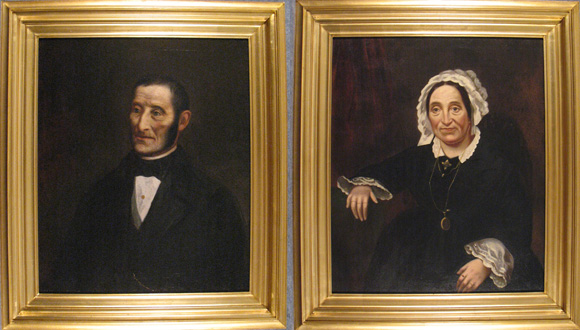| |
| Eisendrath Family in Dorsten |

In 1811 the name of the 27-year-old Samson Nathan
Eisendrath first appears in the town records. He is the third Jew
to receive the right to settle in Dorsten. He is married to Julia
Isaak. In 1812 their first son Baruch is born in Amsterdam. Over
the years many more children followed; we assume there were 18 births.
When an official will was made in 1855, Julia and Samson Nathan
Eisendrath spoke of 11 children still alive, namely: Baruch, David,
Moses, Levi, Nathan, Oskar, Jeanette, Cosman, Benjamin, Adelheid
and Eva.
At first the Eisendrath family lived outside the
city wall but Samson Nathan soon bought a large piece of land on
Wiesen Strasse close to the market place and later purchased other
lots as well. For seventy years the house in Wiesen Strasse, located
close to the synagogue, was the centre of the Eisendrath family’s
life and business.
 "Portraits of Samson Nathan and Julia Eisendrath, around 1870, from family property" "Portraits of Samson Nathan and Julia Eisendrath, around 1870, from family property"
»All for one and one for all.«
Julia Eisendrath was the heart of the house. She died at the ripe
old age of 85 and survived her husband by 21 years. The descendants
say that she was the matriarch who was the boss in the family. She
was proud and very convinced of herself, they say. But above all
she worked very hard and must have been a remarkable housewife who
managed to run such a complicated household. The children loved
and worshipped her. She could not read or write herself but she
forced her children to learn. The family supported each other, the
older siblings helping to bring up the younger ones and all of them
stood up for each other. The Eisendrath clan still has the family
motto which originates from their Dorsten history: “All for
one and one for all.” Julia was also regarded as very generous
and charitable particularly to the poor and needy of any religion.
The records show that she donated money to the Catholic hospital
and a new church building. Samson “son of Nathan” developed
into one of the most important personalities of the Jewish congregation
in Dorsten. He was the first head of the synagogue, co-author of
the statutes, treasurer of the congregation and of the Marks-Haindorf-Foundation,
but he was also responsible for the split in the Dorsten synagogue
which was due to his wishes for reform. For that time Samson Nathan
Eisendrath for a very progressive man. He did not only send his
children to secondary school but also supported the education and
training of other Jewish children. His professional work involved
the purchase and sale of food; he also owned a manufacturing business
and he worked as a butcher and tanner. His sons became traders and
merchants but there were also skilled craftsmen such as tanners
and candle makers among them. His growing prosperity made Nathan
a much respected citizen of Dorsten.
|
|